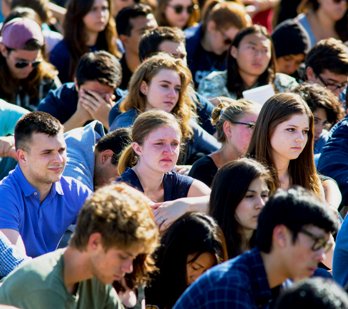How do you make sense of the senseless?
As soon as I logged-on to The Washington Post Saturday morning, I stared in disbelief at a headline reporting that the latest school shooting had occurred just twenty minutes from where I live.

From late Friday night to Monday morning, our small community continues to be shaken by the fact that we have joined a growing list of random and horrific shootings by a disturbed individual. While many feel shock and anger, the families of the victims feel a profound loss at such an irrational tragedy.
Based on his 141-page manifesto, 22-year-old Elliot Rodger – a student undergoing psychotherapy – planned a “Day of Retribution,” aimed primarily at women. However, according to investigators, Rodger was apparently able to control his hostility long enough to legally purchase three semiautomatic handguns, 41 magazines and hundreds of rounds of ammunition to carry out his scheme.
To say that things could’ve been much worse somehow trivializes the lives Rodger took, now identified as Weihan Wang, 20; Cheng Yuan Hong, 20; George Chen, 20; Katherine Cooper, 22; Veronika Weiss, 19; and Christopher Ross Martinez, 20.
Chris Martinez’s father Richard stood before news cameras to express his anger and his outrage with a special message to the many congressional representatives who have called to express their sympathies.
“I don’t care about your sympathy. I don’t give a s— that you feel sorry for me,” Martinez said. “Get to work and do something. I’ll tell the president the same thing if he calls me. Getting a call from a politician doesn’t impress me.”
The day after the shooting, Martinez became the focus of media attention after delivering an impassioned, 90-second speech: “You don’t think it’ll happen to your child until it does. His death has left our family lost and broken. Why did Chris die? Chris died because of craven, irresponsible politicians and the NRA. They talk about gun rights. What about Chris’s right to live? When will this insanity stop?
“I’m angry with the leadership of the NRA who always want to characterize this as if it’s a lone madman,” Martinez said since the incident. “That it’s an act of nature we have to tolerate. I am angered by how they have worked to normalize this.
“I understand this is a complicated problem. I have friends who are in the NRA,” Martinez continued. “I grew up on a farm. I hunted. I killed animals. I understand guns, but assault rifles and semiautomatic weapons? There is no need for those except in war.”
As a community member what disturbed me most were the “expert panels” on cable channels that readily offered speculation and opinion before any of the facts became available. While I understand the need to search for answers when tragedies occur, I think it’s remarkably insensitive to have anyone, no matter how expert, openly express their views on national television before a majority of the facts are in, let alone the completion of a police investigation.
Before the advent of the Internet and cable, a story such as this would have warranted news coverage, but the only people interviewed would likely have been police, family members and/or friends. The media would wait for the results of an investigation before going further. Not anymore.
Far too often, irrational shootings like Columbine, Aurora, Newtown and now Santa Barbara quickly become their own reality shows reaching out to viewers with more “insights” into how and why. The media spends far too much time lingering over the autopsy of the problem and not enough serious attention on the solution.
On Sunday (May 26) The New York Times reported on a group of UCSB women who began looking at the events of Friday through a more critical lens.
” ‘If we don’t talk misogyny now, when are we going to talk about it?’ asked Nancy Yang, a second-year global studies major, as she stood a few feet from a memorial created in the wake of the rampage on Friday night that left six people and the gunman dead and 13 wounded.”
Yang and others were referring to the many rants against women that Rodger spoke of in a YouTube video.
” ‘Yes, we have to have compassion, and we don’t know what this perpetrator was going through, but there are underlying issues here,’ she said. ‘We can’t do that without thinking about the way we talk about and speak to women. This act does not represent our campus at all, but at the same time there’s a palpable sense that there needs to be more dialogue about the factors that led to it.’ ”
“The conversations have also exploded on social media,” The Times continues, “with hundreds of thousands of people using the hashtag #yesallwomen to discuss violence against women and reveal deep-seated feelings of anger and horror at the sexual expectations and violence directed at women.”
The Santa Barbara shootings are just another symptom. Until we can turn our compassion into thoughtful dialogue about the real problems – misogyny, the mental health system and a culture where a vocal minority controls the political will – and let go of the shock and awe of the moment, we will never get close to addressing the serious issue of senseless violence in this country.
Comments









